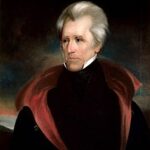Andrew Jackson’s presidency fundamentally transformed American democracy through unprecedented expansion of democratic participation. His administration eliminated property requirements that had restricted voting to wealthy landowners. This revolutionary change opened political participation to ordinary citizens across the nation. 📊 By 1840, voter turnout reached 80% compared to just 27% in 1824.
Dismantling Elite Political Control
Jackson’s democratic philosophy directly challenged existing power structures. He believed government should serve all citizens, not just the wealthy elite. His administration appointed common citizens to federal positions previously reserved for aristocrats. This “spoils system” democratized government employment and broke traditional patronage networks.
Constitutional Democracy in Practice
The Jacksonian era witnessed the practical implementation of constitutional principles. Universal white male suffrage became reality in most states during this period. ⚠️ However, these democratic gains excluded women, Native Americans, and enslaved people. Jackson’s democratic vision remained limited by contemporary social constraints. His presidency nonetheless established precedents for broader democratic participation that would later expand to all Americans.
Impact:
Jackson’s democratic participation expansion created lasting transformational changes in American political culture. The elimination of property requirements fundamentally altered the electoral landscape. 🔥 Political parties adapted by appealing directly to common voters rather than elite interests.
Long-term Democratic Evolution
This democratic expansion established foundations for future civil rights movements. The principle that ordinary citizens deserved political participation became deeply embedded in American culture. Later generations would extend these democratic ideals to previously excluded groups including women and minorities. The concept of democratic equality that Jackson championed would inspire abolitionists and suffragettes.
Political System Transformation
Jacksonian democracy permanently changed American political institutions. Political campaigns became more populist and responsive to public opinion. 📊 Congressional representation shifted toward reflecting broader demographic diversity rather than elite interests.
Historical Legacy and Modern Democracy
Modern American democracy traces its participatory character to Jacksonian reforms. His emphasis on common citizen involvement established democratic norms that persist today. 🌍 International observers noted how American democratic participation exceeded European models. This democratic expansion influenced global democratic movements throughout the 19th century. Jackson’s legacy demonstrates how presidential leadership can fundamentally expand democratic participation and transform political institutions.
